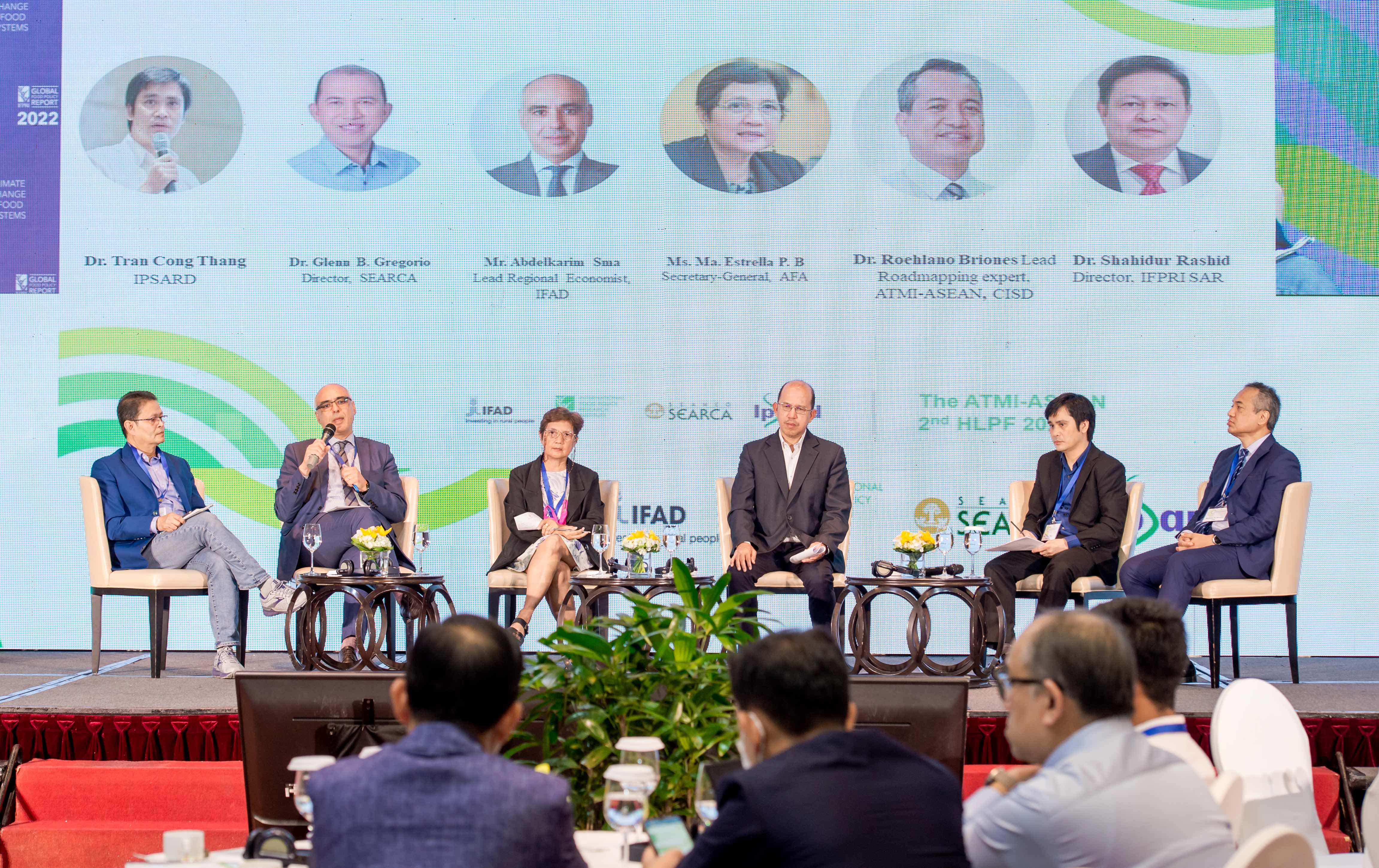Association of Southeast Asian Nations (ASEAN) member states (AMS) have experienced rapid economic growth in recent years, and with their work toward food systems transformation have made significant progress toward meeting Sustainable Development Goal 2 (SDG2) targets of ending hunger, food insecurity, and malnutrition by 2030. Yet many food system challenges remain, driven by effects of the COVID-19 pandemic, rising global food prices, and other problems. ASEAN food value chains are growing more internationalized in an environment of global economic stresses and uncertainty, raising questions about how best to achieve structural change.
The recently-concluded Agricultural Transformation and Market Integration in the ASEAN region (ATMI-ASEAN) project, launched in 2016, focused on strengthening member states’ capacity to develop effective food security and agricultural policies. On June 1-2, project participants and experts met in a high-level policy forum in Hanoi to discuss the project’s five years of rigorous research studies, and ways to continue its momentum through an extended network of policy actors and analysts.
The hybrid event brought together more than 250 stakeholders, including representatives from the Viet Nam Ministry of Agriculture and Rural Development, Cambodia Ministry of Agriculture, Forestry, and Fisheries (MAFF), Myanmar Ministry of Agriculture, Livestock, and Irrigation (MoALI) Myanmar, regional farmer organizations, research institutions, donors, and civil society. Following are highlights from key speakers:
Shahidur Rashid, IFPRI South Asia Director, said the project has done remarkably well on generating evidence, fostering partnership and in developing outreach with ASEAN country policymakers. “The evidence that we have generated and partnership we have established with national institutions needs continued engagement,” Rashid said. To sustain the project’s work and momentum, and facilitate continuing policy dialogues and stakeholder engagement, he said, organizers are setting up a Network of Policy Advisors and Analysts in the ASEAN region (NePAAA).
Tran Cong Thang, Director-General, Institute of Policy and Strategy for Agriculture and Rural Development (IPSARD) emphasized that the project’s research findings and policy recommendations are particularly timely for ASEAN countries, as the region continues the process of economic integration—for example, using economic integration as a development strategy, participating in evolving global value chains and emerging large trading arrangements like Regional Comprehensive Economic Partnership (RCEP).
the project has developed national and regional roadmaps for ASEAN countries; the latter aim to enhance cooperation among AMS through strategic programs and measures in the areas of R&D, food safety and quality standards, and investments in agrifood enterprises.
Glenn B. Gregorio, Director, Southeast Asian Regional Center for Graduate Study and Research in Agriculture (SEARCA), said: “As we showcase evidence-based policy insights best practices and roadmap recommendation to promote small holders’ inclusiveness … the pandemic has highlighted the need for agricultural transformation and market integration.” Member states must continue to communicate and have friendly competition based on improving productivity, and strengthen their collaborative efforts, he said.
Roehlano M. Briones, Senior Research Fellow, Philippine Institute for Development Studies (PIDS), who led the maize and meat regional roadmap exercises, shared some of the resulting recommendations. Integrated investments along the maize and meat value chain, along with public private farmer partnerships, should be encouraged, he stressed, and small farmer organizations and especially small farmers themselves included in these partnerships.
“We need to create a viable system for addressing transboundary concerns related to plant animal and human health. Mainstreaming regional cooperation is something that is quite crucial’ to guide and energize the continued growth and emergence of a region rich intra ASEAN regional trade in maize and meat.” Briones said.
Abdel Karim Sma, IFAD Lead Regional Economist, stressed that the project’s evidence demonstrates participating countries are moving in the right direction. However, stakeholders will have to work together to build on the evidence to develop a coherent roadmap.
“I would say integration in the ASEAN countries is not a luxury but critical necessity. We are witnessing transformation of inherently complex food systems against the backdrop of a heightened turbulence and impact of climate change,” said Sma.
A key component of the project focused on the market integration of Cambodia, Lao PDR, Myanmar, Viet Nam, and the Philippines with ASEAN and its other top trading partners. The studies conducted for the project have found that the exports of all AMS are competitive in ASEAN markets and have high export potential. The findings suggest countries should target commodities and markets in which export potential is high and measured competition is low to achieve higher returns for agricultural producers.
ATMI-ASEAN analyses suggest that structural transformation in the project focal countries is positively driven by agricultural productivity, terms of trade, and public investments in infrastructure, with little role for rural to urban migration or market integration. Efficient, sustainable, and inclusive growth requires more investment in agricultural research and extension systems; and diversifying production portfolios toward higher-value food commodities, by strengthening institutions that link farmers to more profitable markets. Investing in post-harvest infrastructure for food processing is also essential.
Rebika Laishram is a Senior Communications Specialist with IFPRI South Asia.







